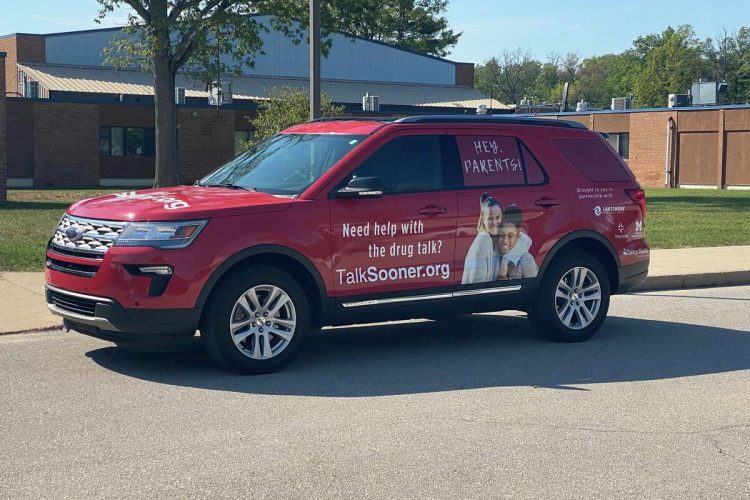Vaping usage among teenagers increases, numerous West Michigan school districts, including Baldwin Community Schools, are doing their part to introduce vaping education to inform families about the risks associated with the addictive habit across the state.
Through a discussion on e-cigarette usage among teenagers, Baldwin Schools is collaborating with TalkSooner, a group that works to educate parents and children about the risks of substance use.
The initiative was created in partnership with the West Michigan counties of Ottawa, Muskegon, Kent, Berrien, and Allegan, under the direction of the Lakeshore Coordinating Council (currently referred to as Lakeshore Regional Entity).
A new educational tool that will offer services to anyone interested in or in need of assistance with adolescent vaping has recently been unveiled thanks to a recent collaboration between the organization and Baldwin Community Schools.
Qur’an Griffin, the District Health Department No. 10’s coordinator for adolescent health, made the vehicle’s district debut on August 24 during a gathering where he answered attendees’ queries.
The project prioritized accessibility, therefore the car has resources from TalkSooner displayed on both sides of the car, one in English and the other in Spanish.
Data from the 2018 National Youth Tobacco Survey (NYTS) show a 48% rise in current e-cigarette usage among middle and high school students between 2017 and 2018, with more than 3.6 million pupils doing so in 2018.
According to Griffin, the prevalence of usage demonstrates the need for more parental education in schools.
Griffin added, “If you take smoking as an example, there aren’t nearly as many smokers today as there were in the 1950s and 1960s because we not only had prevention, but we also had education. “Now that we are aware of the risks associated with smoking, we can avoid or minimize them.
“We want to make sure we’re now doing the same with these youngsters who start using these e-cigarettes at 13 or 14 to catch and break that habit early, or at the very least make sure they’re aware of the risks that come with them,” said the researcher.
Gov. Gretchen Whitmer signed Senate Bills 106 and 155 on June 4, 2019, making it illegal for anyone under the age of 18 to purchase or possess an e-cigarette.
The legal age to purchase or use tobacco products, including e-cigarettes, was raised to 21 by federal legislation that was passed in December 2019.
Many people nevertheless object to the number of young kids who continue to vape in spite of these precautions.
Griffin has personally witnessed the usage of vaping among her own children and is aware of the challenges in broaching the subject with teenagers.
The most crucial topic, according to Griffin, was prevention education because it not only addressed one’s physical health but also their overall mental, emotional, and physical well-being. “With my own family, my experience demonstrated that even families with the highest levels of education may fall prey to pressures and societal influences with things like vaping.”
She continued, “I always encourage parents to have honest dialogues with their children. Just having frank and open discussions about their own difficulties or with some of the decisions that young people have made. Additionally, I would advise attempting to identify the underlying reasons why they either choose to vape or are interested in doing so.”
In September 2018, the Food and Drug Administration (FDA) issued over 1,300 warning letters to business owners who had illegally provided e-cigarette goods to people under the age of 18. These warning letters also included civil money penalties and fines. Most of these stores sold Juul, Logic, Vuse, MarkTenXL, and blu; this was the most meticulously planned enforcement operation in FDA history.
The Centers for Disease Control and Prevention report that certain vape product labels fail to mention the presence of nicotine, and that nicotine has been discovered in several vape liquids that were advertised as having 0 percent nicotine.
Adolescent brain development, which lasts into the early to mid-20s, is harmed by nicotine use in the areas of the brain that regulate impulse control, mood, learning, and attention.
On September 8 from 4:30 to 5:30 p.m. at the Kent County Health Department, 700 Fuller Avenue in Grand Rapids, TalkSooner will hold a lecture on vaping prevention education for West Michigan families.
Griffin argued that one of the most effective ways to reduce the number of kids engaging in these activities is to continue educating people about the risks associated with substance addiction.






